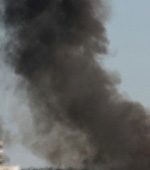Sulfur Fire at Mishraq State Sulfur Mine
A fire that ignited in June 2003 at the Mishraq State Sulfur Mine Plant near Mosul, Iraq burned for almost a month. Field samples of air in the vicinity of the fire detected sulfur dioxide at levels immediately dangerous to health and life. Hydrogen sulfide also was released. Exposure varied by wind and fire conditions over time.
Firefighters were considered the most exposed. Firefighters were primarily from the 101st Airborne Division – 52nd Engineer Battalion, 326th Engineer Battalion, and the 887th Engineer Battalion.
A group of soldiers from Fort Campbell, KY who were stationed in Iraq, most of whom had prolonged exposure to sulfur dioxide during the Mishraq Sulfur Mine fire, were evaluated for pulmonary symptoms in 2007. Many of these Servicemembers reported a significant change in their ability to run two miles on the Army Physical Fitness Test.
Health effects from sulfur dioxide exposure
Servicemembers involved with fighting this fire experienced irritation, minor burns, and blood-tinged nasal mucous.
Both sulfur dioxide and hydrogen sulfide are gases that can produce irritation and reddening of the nose and throat, eye irritation, and coughing. At high levels, these gases can burn the skin and cause severe airway obstruction, hypoxia (inadequate supply of oxygen to the body) and pulmonary edema (fluid accumulation in the lungs).
Short-term high-level exposure has been associated with a rare condition of lung damage known as constrictive bronchiolitis and an asthma-like condition known as reactive airway dysfunction syndrome.
Health concerns?
If you are concerned about exposures during the Mishraq Sulfur Mine fire, talk to your health care provider or contact your local VA Environmental Health Coordinator to help you get more information from a health care provider.
VA offers a variety of health care benefits to eligible Veterans. Not enrolled in the VA health care system? Find out if you qualify for VA health care.
Compensation benefits for health problems
Veterans may file a claim for disability compensation for health problems they believe are related to exposures during the Mishraq Sulfur Mine fire. VA decides these claims on a case-by-case basis. File a claim online.
Learn more about VA benefits.
Sulfur Fire
A fire at a sulfur mine plant released harmful chemicals into the air.
The fire was ignited at the Mishraq State Sulfur Mine Plant near Mosul, Iraq and burned for almost a month.
Operation Enduring Freedom (OEF) / Operation Freedom's Sentinel (OFS), Operation Iraqi Freedom (OIF) / Operation New Dawn (OND)
Both sulfur dioxide and hydrogen sulfide, which were released into the air as a result of the fire, are gases that can produce irritation and reddening of the nose and throat, eye irritation, and coughing. At high levels, these gases can burn the skin and cause severe airway obstruction, hypoxia (inadequate supply of oxygen to the body) and pulmonary edema (fluid accumulation in the lungs).
Short-term high-level exposure has been associated with a rare lung condition known as constrictive bronchiolitis and an asthma-like condition known as reactive airway dysfunction syndrome.
- Mishraq Sulfur Mine Fire webpage
- https://www.publichealth.va.gov/exposures/mishraq-sulfur-fire/index.asp
- DoD - Sulfur Fire Assessment (army.mil)
- https://phc.amedd.army.mil/PHC%20Resource%20Library/SulfurFireAssessmentFS64-007-0612.pdf
Get a Registry Evaluation
- Environmental Health Coordinator
- https://www.publichealth.va.gov/exposures/coordinators.asp
Contact your local https://www.publichealth.va.gov/exposures/coordinators.asp or VA Primary Care Team about getting a registry evaluation.
WRIISC Link
- War Related Illness and Injury Study Center (WRIISC)
- https://www.warrelatedillness.va.gov/WARRELATEDILLNESS/referral/index.asp
For evaluation for difficult-to-diagnose conditions, contact your local https://www.warrelatedillness.va.gov/WARRELATEDILLNESS/referral/index.asp.
Airborne Hazards and Open Burn Pit Registry
- https://veteran.mobilehealth.va.gov/AHBurnPitRegistry/
Airborne Hazards and Open Burn Pit Registry: VA's Office of Public Health has established a registry for individuals concerned about exposure to airborne hazards during recent deployments. To be eligible, you must be a Veteran or Servicemember who deployed to contingency operations in Southwest Asia at any time on or after August 2, 1990 (as defined in 38 CFR 3.317(e)(2)), or Afghanistan or Djibouti on or after September 11, 2001. These regions include the following countries, bodies of water, and the airspace above these locations:
- Iraq
- Afghanistan
- Kuwait
- Saudi Arabia
- Bahrain
- Djibouti
- Gulf of Aden
- Gulf of Oman
- Oman
- Qatar
- United Arab Emirates (UAE)
- Waters of the Persian Gulf, Arzabian Sea, and Red Sea
The registry consists of a web-based self-assessment to be completed by the eligible individual, which can be found at: http://www.publichealth.va.gov/exposures/burnpits/action-plan.asp. Participants may also schedule an optional in-person clinical evaluation by a VA provider. Active Duty service members who would like a similar voluntary medical evaluation may contact your local military hospital or clinic and state that you would like an appointment specifically to address health concerns related to the Airborne Hazards and Open Burn Pit Registry exposures. Please note a medical evaluation is NOT required to be in the registry.
- For more information, visit: https://veteran.mobilehealth.va.gov/AHBurnPitRegistry/
1990 2100 Gulf War, Operation Enduring Freedom (OEF) / Operation Freedom's Sentinel (OFS) Southwest Asia, South-Central Asia, Africa





















